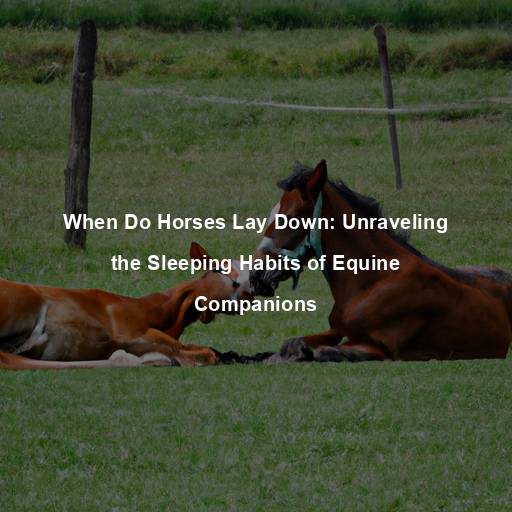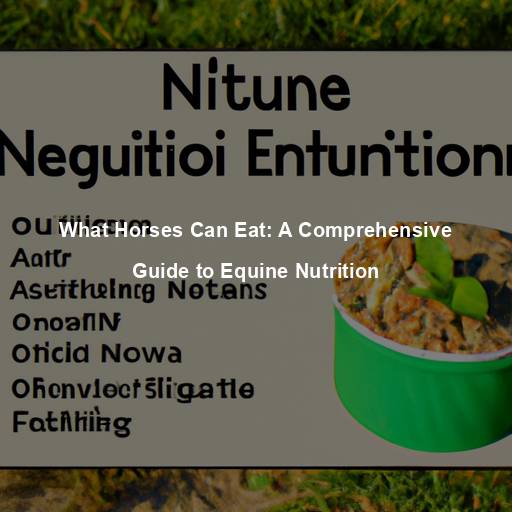Can Horses Eat Apples? Exploring the Relationship Between Horses and this Popular Fruit
Last Updated on July 16, 2023 by Evan
Contents [hide]
- 1 Understanding the Equine Diet: What Can Horses Eat?
- 1.1 The Nutritional Value of Apples
- 1.2 Moderation is Key
- 1.3 Potential Benefits of Apples for Horses
- 1.4 Considerations and Potential Risks
- 1.5 Feeding Apples to Horses: Best Practices
- 1.6 Chewing and Salivation
- 1.7 Stomach and Small Intestine
- 1.8 Fiber Fermentation in the Cecum and Large Intestine
- 1.9 The Role of Insulin and Sugar Metabolism
- 1.10 The Importance of Individual Considerations
- 2 FAQs – Can Horses Eat Apples
Understanding the Equine Diet: What Can Horses Eat?
The mesmerizing allure of horses extends far beyond their breathtaking appearance – their mystique lies within their captivating combination of beauty, power, and elegance. As conscientious equestrians, it is our utmost responsibility to safeguard their overall welfare, encompassing their dietary requirements. While hay, grass, and grains undeniably compose the backbone of their nourishment, numerous equestrians often ponder whether our equine companions can partake in the occasional indulgence, such as the delectable fruit we humans adore – apples. In this enchanting narrative, we embark on a quest to unravel the enigmatic conundrum: can equines truly relish the succulent goodness of apples?
The Nutritional Value of Apples
Before we can answer this question, it is essential to understand the nutritional composition of apples. Apples are rich in vitamins, minerals, and dietary fiber, making them a popular choice for humans seeking a healthy snack. They contain vitamin C, vitamin A, potassium, and antioxidants, all of which contribute to overall well-being.
Moderation is Key
When it comes to feeding apples to horses, it’s important to strike the right balance between health and indulgence. Just like humans, horses have their own set of dietary needs that require careful consideration. While apples do offer some nutritional benefits, it’s essential to keep in mind that they should be treated as a special treat rather than a regular dietary component. Moderation is the key to ensuring the optimal well-being of our equine friends.
Potential Benefits of Apples for Horses
When fed in moderation, apples can provide various benefits for horses. Here are some potential advantages:
-
Hydration: Apples have a high water content, which can help keep horses hydrated, particularly during hot weather or intense physical activity.
-
Dental Health: Chewing on apples can promote saliva production, aiding in the natural cleansing of a horse’s teeth and helping to prevent dental issues.
-
Mental Stimulation: Offering apples as treats can provide mental stimulation for horses, encouraging them to engage with their environment and providing a positive reinforcement during training sessions.
When it comes to keeping our equine friends feeling their best, it’s important to consider the role of dietary fiber found in apples. Not only does it help maintain a healthy digestive system, but it also supports regular bowel movements, ensuring smooth sailing for our horse’s gastrointestinal tract. So, if you’re looking to add a natural source of fiber to your horse’s diet, consider reaching for the humble apple – a burst of goodness that will leave your equine companion feeling happily perplexed!
Considerations and Potential Risks
When it comes to treating our equine companions, apples often take the spotlight for their health benefits and palatability. However, it is essential to approach this popular snack with a dash of caution and an understanding of the potential perplexities that may arise. While horses generally adore the burst of sweetness, we must be wary of the risks lurking beneath the surface of this seemingly innocuous fruit. So, saddle up and join us as we explore the mysterious realm of apple consumption in our equine friends.
When it comes to our equine companions, we must always tread cautiously. Surprisingly, some horses may possess an unexpected sensitivity towards the seemingly innocent apple. Keep a keen eye for peculiar signs, such as unrelenting itching, alarming swelling, or even labored breathing, as these could indicate an adverse reaction when offering them this fruity delight for the first time.
-
Sugar Content: Apples contain natural sugars, primarily fructose, which can contribute to weight gain and metabolic issues if consumed in excess. It is crucial to limit the quantity of apples given to horses, particularly those with conditions such as insulin resistance or equine metabolic syndrome.
-
Seeds and Cores: While the flesh of apples is generally safe for horses to consume, it is important to remove the seeds and core before offering the fruit. Apple seeds contain a compound called amygdalin, which can release cyanide when chewed or crushed. Although a few seeds are unlikely to cause harm, it is best to err on the side of caution and remove them entirely.
Feeding Apples to Horses: Best Practices
Discover the quintessential guide to seamlessly integrating the delightful crunch of apples into your equine companion’s dietary regimen. With a plethora of expert-endorsed tips, unlock the secrets to harnessing the nutritional benefits of this succulent fruit for optimal horse health. Delve into a realm of equine culinary curiosity as you navigate through the maze of best practices, ensuring a harmonious blend of equestrian excellence and apple-infused vitality. Embrace the intrigue and embrace the challenge of revolutionizing your horse’s menu in pursuit of a flavored journey like no other.
Ensuring the utmost care for your equine companion is a priority when it comes to feeding them treats like apples. Take a moment to meticulously cleanse the fruit, eliminating any traces of harmful pesticides or unwanted substances. By doing so, you can guarantee a wholesome experience for your trusty steed.
When it comes to feeding apples to your equine companion, ensuring their safety is of utmost importance. One effective method to minimize any potential choking hazards is by simply opting to slice or dice the apple into smaller, bite-sized pieces. By doing so, not only are you reducing the risk of any mishaps, but you are also making it more manageable for your four-legged friend to chew and digest the fruit with ease.
Finding the right balance is everything when it comes to feeding your beloved equine companion. Excessive apple indulgence may lead to undesirable consequences, such as unwelcome weight gain. To maintain a healthy and harmonious equilibrium, it’s best to exercise restraint by limiting the quantity to just a couple of dainty apple slices as a delightful occasional treat.
When embarking on the apple feeding journey for your beloved equine companion, it is of utmost importance to keep a vigilant eye for any signs of allergic reactions or sensitivities that may arise. The introduction of this new fruit into their diet can bring forth unexpected perplexities, so be prepared to swiftly respond. In the event that your horse exhibits any adverse symptoms, it is advisable to discontinue the apple feeding routine and seek guidance from your trusted veterinarian to ensure your horse’s well-being.
Chewing and Salivation
When a magnificent equine indulges in the delightful crispness of an apple, the intricate dance of digestion commences with a symphony of mastication. With their formidable dental arsenal, horses gracefully shatter the fruit into bite-sized fragments, priming them for the enchanting alchemy of transformation. The act of chewing stimulates the ethereal elixir of saliva, an alchemical potion that initiates the ethereal dismantling of the apple’s ethereal carbohydrates.
Stomach and Small Intestine
When an apple is consumed by a horse, the experience takes an intriguing turn. The apple pulp, after encountering the majestic dance of chewing and mingling with saliva, embarks on a perplexing journey into the depths of the equine stomach. Surprisingly, the stomach in horses is not one to steal the spotlight, but rather a humble entity, constituting a mere 10% of their entire digestive system. Thus, its role in further breaking down the apple is minimal, leaving us in a state of curiosity and awe.
In the mesmerizing world of equine biology, the small intestine exerts its dominion as the primary hub for digestion and nutrient absorption. As the tantalizingly delectable apple pulp embarks on its journey through the mystical chambers of this intricate organ, a symphony of enzymes takes center stage, orchestrating the meticulous breakdown of carbohydrates, proteins, and fats nestled within the fruit’s embrace. A grand spectacle unfolds as the nutrients, akin to precious gems, dance their way into the bloodstream, igniting a burst of newfound vitality and sustenance within the majestic equine creature.
Fiber Fermentation in the Cecum and Large Intestine
When it comes to the intricate world of equine digestion, the spotlight inevitably falls on the enigmatic cecum. Nestled at the crossroads of the small and large intestines, this enigmatic fermentation chamber is nothing short of a perplexing marvel. While its expertise lies in breaking down fibrous vegetation like hay and grass, one might wonder about the role it plays when faced with a seemingly less formidable foe: the mighty apple. Unraveling the complex dynamics, it turns out that apples, though not as fibrous as their hay counterparts, still pack a punch in the form of dietary fiber, making them a potential ally in maintaining a well-oiled digestive system.
When horses consume apples, the fiber present in the fruit moves through the small intestine and reaches the cecum. Microbes in the cecum ferment the fiber, breaking it down into volatile fatty acids (VFAs) that serve as a source of energy for the horse. This fermentation process is essential for maintaining a healthy microbial population in the gut and promoting proper digestion.
The Role of Insulin and Sugar Metabolism
There has been some debate surrounding the practice of feeding apples to horses, mainly due to the sugar levels found in this juicy fruit. It’s worth noting that apples do indeed contain natural sugars, with fructose taking the lead. However, we must consider the fascinating intricacies of a horse’s metabolic system, which sets them apart from us humans when it comes to processing sugars.
In horses, the release of insulin is not triggered by sugar consumption alone, as it is in humans. Instead, insulin is primarily released in response to starches present in grains and certain forages. This means that the sugar content in apples is less likely to cause a significant insulin response in horses, making it a relatively safe treat when given in moderation.
The Importance of Individual Considerations
While it is generally safe for horses to eat apples, it is crucial to consider each horse’s individual health and dietary needs. Some horses may have specific health conditions or sensitivities that require stricter dietary guidelines. Here are some individual considerations to keep in mind:
Horses with Metabolic Conditions
Caring for horses with metabolic conditions like insulin resistance or equine metabolic syndrome requires careful consideration of their dietary needs. These conditions impede the horses’ ability to effectively process sugars and carbohydrates, necessitating a thoughtful approach to their nutrition. To ensure their well-being, it is crucial to control the amount of apple provided, as it can lead to abrupt spikes in blood sugar levels and subsequent complications. Seeking guidance from a veterinarian will enable tailored dietary recommendations that align with the specific needs of these horses.
Allergies and Sensitivities
Like humans, horses can have allergic reactions or sensitivities to certain foods, and apples are no exception. It’s important to keep a close eye on your horse after introducing apples to their diet, watching out for any unusual signs like itching, hives, or breathing difficulties. If you notice any of these symptoms, it’s crucial to stop feeding apples and seek professional advice from your trusted veterinarian to ensure your horse’s well-being.
Weight Management
Horses that are overweight or prone to weight gain should have their caloric intake closely monitored, including treats like apples. While apples can be a healthy snack, excessive consumption can contribute to weight gain. It is crucial to incorporate apples into the horse’s diet mindfully and in moderation.
FAQs – Can Horses Eat Apples
Can horses eat apples?
Horses and apples? A match made in equine heaven! These majestic creatures can indeed feast on this juicy, delectable fruit. However, be aware of the lurking dangers that lie within the apple: those pesky seeds and cores. They can be quite the choking hazard for our four-legged friends, not to mention potentially harboring toxic substances. So, remember, moderation is key for maintaining a well-rounded equine diet. In other words, hold the apples, but not the caution!
Are all types of apples safe for horses?
When it comes to feeding apples to our equine friends, caution is key. While apples may seem like a healthy treat, not all varieties are a horse’s best friend. Moldy or rotten apples, in particular, can wreak havoc on a horse’s sensitive digestive system, leading to an array of unsettling health issues. Moreover, certain horses may exhibit sensitivities or even allergies to specific apple types. To avoid any unwelcome surprises, it’s wise to introduce novel varieties at a leisurely pace, carefully monitoring for any unforeseen adverse reactions before generously doling out these fruity delights.
How should apples be prepared for horses?
Before feeding apples to horses, it is crucial to wash them thoroughly to remove any dirt or potential pesticides. Next, slice the apples into smaller, bite-sized pieces, making sure to remove the seeds and core. This helps minimize the risk of choking and digestive problems. Some horse owners also prefer to peel the apples to avoid any possible pesticide residue, although this step is not necessary if the apples are organic or have been thoroughly washed.
How many apples can horses eat?
While horses can enjoy the occasional apple treat, it’s important to remember that apples should not replace their regular balanced diet. Feeding horses large quantities of apples can lead to digestive issues or even an upset in their nutritional balance. As a general guideline, it is recommended to limit apple consumption to no more than one or two apples per day per horse.
Are there any risks associated with feeding horses apples?
Feeding apples to horses in moderation is considered safe for the majority of horses. However, some horses may have specific medical conditions or sensitivities that make apple consumption inappropriate. For instance, horses with insulin resistance or equine metabolic syndrome should be on a strict diet and might need to avoid high-sugar fruits like apples. It is always advisable to consult with a veterinarian before introducing new foods or treats into a horse’s diet, especially if the horse has any pre-existing health conditions.
Can apple seeds be harmful to horses?
As enchanting as biting into a crisp, juicy apple can be, it’s crucial to untangle the intricate mystery hiding within its core. Unbeknownst to many, apple seeds, seemingly innocent in appearance, hold a secret: a minute amount of cyanide, lurking amidst the shadows as amygdalin. While this may not pose an imminent threat to our majestic equine friends when consumed in small quantities, it is not without its concerns. To err on the side of caution, experts advise meticulously excising both seeds and core before tempting our four-legged companions with this tantalizing treat. By doing so, we circumvent potential choking hazards while mitigating the possibility of gradually exposing horses to excessive cyanide levels that could weave a detrimental tapestry of health issues over time.







